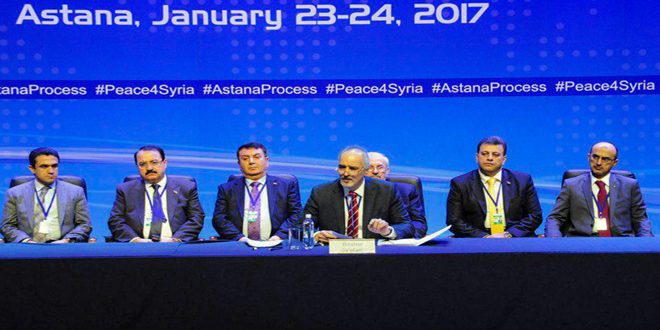ASTANA, (ST)- Dr. Bashar Al-Jaafari, Head of the Syrian Arab Republic’s Delegation to Astana International Meeting on Syrian Settlement stressed on Tuesday that the meeting has succeeded in achieving the goal of enhancing the cessation of hostilities for a period of time as to pave the way for resuming the intra-Syrian dialogue.
In a press conference at the end of Astana meeting, al-Jaafari addressed the regional countries, known for supporting terrorists in Syria, saying “stop, you have wasted your peoples’ money, brought terrorism to your countries and caused the Syrian bloodshed. It is time to reconsider your mistakes for the good of your people and for other peoples of the region.”
He went on to say that the communiqué, issued by the three guarantor states (Iran, Russia and Turkey), includes an item saying that the guarantor countries are sharing the goal of fighting terrorism, mainly “Daesh” and “Jabhat al-Nusra” terrorist organizations.
“We assume that Turkey will be committed to achieving this goal,” said al-Jaafari, pointing out that Turkey, besides Qatar and Saudi Arabia were among the regional countries that have supported terrorism.
He stressed that “the opportunity is available for these countries to change their bloody policies towards the Syrian people and towards their own peoples.”
“Stop playing with fire, stop betting on losing cards…all are losers including terrorism supporters. Terrorism has reached their countries and this is what we have warned against from the very beginning,” al-Jaafari said.
It was painful to sit with terrorists in the same room
 Regarding sitting with the terrorist groups in the same hall, al-Jaafari said that “it was painful for us to sit in the same hall and the same room with other Syrians who are linked to foreign agendas and some of them are affiliated to terrorist groups.”
Regarding sitting with the terrorist groups in the same hall, al-Jaafari said that “it was painful for us to sit in the same hall and the same room with other Syrians who are linked to foreign agendas and some of them are affiliated to terrorist groups.”
Al-Jaafari added “however, whatever the price might be we will do that to save our country and stop the terrorist war on our people in accordance with a special agenda and future meetings.. we don’t do that without planning.”
As for the mechanism to observe the cessation of hostilities, al-Jaafari said there will be a trilateral mechanism, as stated in the final Joint Statement, that will meet later to set up formulas and methods of work, noting that all of that will be done in consultation with the Syrian government.
On the terrorist groups’ delegation’s statement on Iran’s role in the meeting, al-Jaafari stressed that Iran is one of the three guarantors that secured reaching the agreement signed on December 29th which was accepted by members of the terrorist groups’ delegation.
On ending the classification of the groups that participated in the meeting as terrorist organizations, al-Jaafari said that these armed terrorist groups decided to follow a course that ends their terrorist practices and become part of the cessation of combat activities, meaning that by taking part in this meeting, they decided to reject violence and terrorism, adding that ISIS and al-Nusra are classified as terrorist entities by the Security Council, according to SANA.
On areas covered by the cessation of combat activities and whether Barada valley is part of them, he pointed out that the valley area consists of 8 or 9 villages that were liberated and the only one left in Ein al-Figeh town, therefore the issue isn’t about the whole valley but only that one town where the main spring providing drinking water to 7 million people Damascus is located, and Jabhat al-Nusra is using their position in that town to pressure people and the government via water, therefore military operations will continue there.
He went on to say that regarding other areas, this issue will be decided by military experts in their next meetings which should result in detailed maps and exchanging information to identify the exact locations of ISIS, al-Nusra, and groups affiliated to them.
 Regarding the omission of the reference to Syria’s secularism in the statement, al-Jaafari said that this was upon the request of Turkey and the armed groups, which is odd since the Turkish government claims that Turkey is secular, but when it comes to Syria, it stands against secularism.
Regarding the omission of the reference to Syria’s secularism in the statement, al-Jaafari said that this was upon the request of Turkey and the armed groups, which is odd since the Turkish government claims that Turkey is secular, but when it comes to Syria, it stands against secularism.
“For our part, we insisted on the issue of secularism being one of the features of the coming Syrian state that Syrians will agree upon, and our Iranian and Russian friends agreed to that; only the Turkish delegation and the armed groups’ delegation rejected that,” he said.
On announcing so-called federalism in some areas, al-Jaafari said that such a thing would be decided by all Syrians, and is not decided unilaterally by a single component of the Syrians, adding that such ideas, even one as crazy as federalism, must be put to democratic vote.
Hamda Mustafa

